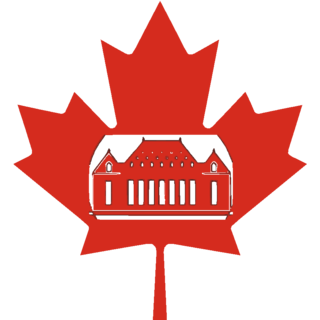
The Supreme Court of Canada is the highest court in the judicial system of Canada. It comprises nine justices, whose decisions are the ultimate application of Canadian law, and grants permission to between 40 and 75 litigants each year to appeal decisions rendered by provincial, territorial and federal appellate courts. The Supreme Court is bijural, hearing cases from two major legal traditions and bilingual, hearing cases in both official languages of Canada.
In Canadian and New Zealand law, fundamental justice is the fairness underlying the administration of justice and its operation. The principles of fundamental justice are specific legal principles that command "significant societal consensus" as "fundamental to the way in which the legal system ought fairly to operate", per R v Malmo-Levine. These principles may stipulate basic procedural rights afforded to anyone facing an adjudicative process or procedure that affects fundamental rights and freedoms, and certain substantive standards related to the rule of law that regulate the actions of the state.

Hill v Church of Scientology of Toronto February 20, 1995- July 20, 1995. 2 S.C.R. 1130 was a libel case against the Church of Scientology, in which the Supreme Court of Canada interpreted Ontario's libel law in relation to the Canadian Charter of Rights and Freedoms.

R v Big M Drug Mart Ltd(Her Majesty The Queen in Right of Canada v Big M Drug Mart Ltd) is a landmark decision by Supreme Court of Canada where the Court struck down the federal Lord's Day Act for violating section 2 of the Canadian Charter of Rights and Freedoms. This case had many firsts in constitutional law including being the first to interpret section 2.

Andrews v Law Society of British Columbia, [1989] 1 SCR 143 is the first Supreme Court of Canada case to deal with the equality rights provided under Section 15 of the Canadian Charter of Rights and Freedoms. British law graduate Mark David Andrews challenged the validity of Section 42 of the Barristers and Solicitors Act contending that the Canadian citizenship requirement for being called to the bar violated Section 15 of the Charter.
Section 1 of the Canadian Charter of Rights and Freedoms is the section that confirms that the rights listed in the Charter are guaranteed. The section is also known as the reasonable limits clause or limitations clause, as it legally allows the government to limit an individual's Charter rights. This limitation on rights has been used in the last twenty years to prevent a variety of objectionable conduct such as child pornography, hate speech, and obscenity.
Willard Zebedee "Bud" Estey was a Canadian justice of the Supreme Court of Canada.
Section 2 of the Canadian Charter of Rights and Freedoms ("Charter") is the section of the Constitution of Canada that lists what the Charter calls "fundamental freedoms" theoretically applying to everyone in Canada, regardless of whether they are a Canadian citizen, or an individual or corporation. These freedoms can be held against actions of all levels of government and are enforceable by the courts. The fundamental freedoms are freedom of expression, freedom of religion, freedom of thought, freedom of belief, freedom of peaceful assembly and freedom of association.
Section 24 of the Canadian Charter of Rights and Freedoms provides for remedies available to those whose Charter rights are shown to be violated. Some scholars have argued that it was actually section 24 that ensured that the Charter would not have the primary flaw of the 1960 Canadian Bill of Rights. Canadian judges would be reassured that they could indeed strike down statutes on the basis that they contradicted a bill of rights.

R v Sparrow, [1990] 1 S.C.R. 1075 was an important decision of the Supreme Court of Canada concerning the application of Aboriginal rights under section 35(1) of the Constitution Act, 1982. The Court held that Aboriginal rights, such as fishing, in existence in 1982 are protected under the Constitution of Canada and so they cannot be infringed without justification on account of the government's fiduciary duty to the Aboriginal peoples of Canada.
Section 35 of the Constitution Act, 1982 provides constitutional protection to the indigenous and treaty rights of indigenous peoples in Canada. The section, while within the Constitution of Canada, falls outside the Canadian Charter of Rights and Freedoms. The section does not define the term "aboriginal rights" or provide a closed list; some examples of the rights that section 35 has been found to protect are fishing, logging, hunting, the right to land and the right to enforcement of treaties. There remains a debate over whether the right to indigenous self-government is included within section 35. As of 2006 the Supreme Court of Canada has made no ruling on the matter. However, since 1995 the Government of Canada has had a policy recognizing the inherent right of self-government under section 35.

Delgamuukw v British Columbia, [1997] 3 SCR 1010, also known as Delgamuukw v The Queen, Delgamuukw-Gisday’wa, or simply Delgamuukw, is a ruling by the Supreme Court of Canada that contains its first comprehensive account of Aboriginal title in Canada. The Gitxsan and Wet’suwet’en peoples claimed Aboriginal title and jurisdiction over 58,000 square kilometers in northwest British Columbia. The plaintiffs lost the case at trial, but the Supreme Court of Canada allowed the appeal in part and ordered a new trial because of deficiencies relating to the pleadings and treatment of evidence. In this decision, the Court went on to describe the "nature and scope" of the protection given to Aboriginal title under section 35 of the Constitution Act, 1982, defined how a claimant can prove Aboriginal title, and clarified how the justification test from R v Sparrow applies when Aboriginal title is infringed. The decision is also important for its treatment of oral testimony as evidence of historic occupation.
Canadian constitutional law is the area of Canadian law relating to the interpretation and application of the Constitution of Canada by the courts. All laws of Canada, both provincial and federal, must conform to the Constitution and any laws inconsistent with the Constitution have no force or effect.

William Ian Corneil Binnie is a former puisne justice of the Supreme Court of Canada, serving from January 8, 1998 to October 27, 2011. Of the justices appointed to the Supreme Court in recent years, he is one of the few appointed directly from private practice. On his retirement from the Court, he was described by The Globe and Mail as "arguably the country's premier judge", by La Presse as "probably the most influential judge in Canada of the last decade" and by the Toronto Star as “one of the strongest hands on the court.”

Calder v British Columbia (AG) [1973] SCR 313, [1973] 4 WWR 1 was a decision by the Supreme Court of Canada. It was the first time that Canadian law acknowledged that aboriginal title to land existed prior to the colonization of the continent and was not merely derived from statutory law.

R v Keegstra, [1990] 3 SCR 697 is a freedom of expression decision of the Supreme Court of Canada where the court upheld the Criminal Code provision prohibiting the wilful promotion of hatred against an identifiable group as constitutional under the freedom of expression provision in section 2(b) of the Canadian Charter of Rights and Freedoms. It is a companion case to R v Andrews.

The Supreme Court of Canada was founded in 1875 and has served as the final court of appeal in Canada since 1949. Its history may be divided into three general eras. From its inception in 1875 until 1949, the Court served as an intermediate appellate court subject to appeal to the Judicial Committee of the Privy Council in Britain. Following 1949, the Court gained importance and legitimacy as the court of last resort in Canada, establishing a greater role for the Canadian judiciary. In 1982, the introduction of the Canadian Charter of Rights and Freedoms significantly changed the role of the Court in Canadian society, by providing the Court with greater powers of oversight over Parliament and through formal recognition of civil rights including aboriginal rights and equality rights.
In Canadian constitutional law, the doctrine of paramountcy establishes that where there is a conflict between valid provincial and federal laws, the federal law will prevail and the provincial law will be inoperative to the extent that it conflicts with the federal law. Unlike interjurisdictional immunity, which is concerned with the scope of the federal power, paramountcy deals with the way in which that power is exercised.

Canadian administrative law is the body of law that addresses the actions and operations of governments and governmental agencies in Canada. That is, the law concerns the manner in which courts can review the decisions of administrative decision makers such as a board, tribunal, commission, agency, or Crown minister, while exercising ministerial discretion.
List of reasons written by Justice Bertha Wilson during her time as puisne justice of the Supreme Court of Canada.





